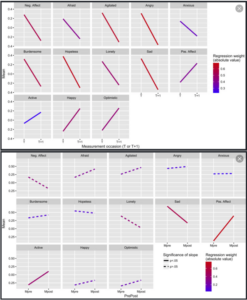Dr. Evan Kleinman’s study examines whether the occurrence of suicidal thinking was followed by decreased negative affect and increased positive affect in 43 adult participants who attempted suicide at least once in the past year.
The mEMA System was used to run 28 days of smartphone-based real-time monitoring, where participants were signaled four times per day to report on current affect and whether they were having suicidal thoughts. Additionally, participants, could initiate a survey whenever they had a suicidal thought.
Changes in affect occurred when suicidal thinking was active at the current time but not at approximately 4-8 hours later. Negative affect decreased and positive affect increased when participants went from a period when they were experiencing suicidal thoughts to a period where they were not. Findings provided preliminary evidence that suicidal thinking leads to shifts in affect. These shifts in affect may be reinforcing, helping to explain why suicidal thinking is so persistent for some patients.

Evan M. Kleinman, PhD
Assistant Professor, Department of Psychology, Rutgers, The State University of New Jersey


